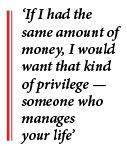

THE BUTLERS IN English literature, and there are plenty to choose from, have tended to be supermen in morning suits, forever saving the day for their bumbling employers, though one suspects that in Victorian England a real-life Jeeves would have been hard to find.
Not so now. Butlering in the 21st century is not about ironing the newspapers or flirting with the scullery maid. Today butlers, or ‘household managers’ in modern parlance, may equally be expected to rustle up a Michelin-star-worthy dinner for 30, develop a computer database for the wine cellar or help the children with their Mandarin homework.

The need for specialist skills is reflected in salaries, with a highly experienced butler often commanding £50,000 or more, and also in the number of expensive butler training schools aimed at turning hopeful young men into immaculately suited polymaths. The British Butler Institute’s four-week butler training course costs £4,500 and teaches a range of skills from wine selection and event planning to ‘facial expressions’.
However, Debbie Salter, managing director of Greycoat Lumleys, says she would be unlikely to add a fresh graduate to her books. ‘Experience is far more important, particularly when it comes to navigating the surreal world of the super-rich’, she says. ‘Our butlers need to be able to assimilate themselves into the most demanding situations with apparent ease.’
David, who worked as a butler for over a decade, explained how one morning the wealthy Middle Eastern family he worked for decided they wanted steak. Offering to make a trip to the local deli would have been the wrong response: ‘They took their private jet, the size of a 737 with two pilots and a waiter on board, and flew to New York to buy steak from a particular shop they favoured.’
It isn’t often that butlers agree to share their experiences — Paul Burrell, Princess Diana’s loose-lipped former butler, is treated with unique disdain within his profession — but thankfully two agreed to help Spear’s shed some light on the profession. Both had already enjoyed varied and successful careers before entering domestic service.
David had worked as an accountant for 22 years before buying and running a small restaurant in Scotland for a further six-and-a-half.
Steven, who has been working as a butler and house manager for eight years, began his career as a chef, working his way up to become a chef de partie after three years (‘A private house has to be looked at as a small Michelin-starred restaurant,’ he observes). He then retrained as a mixologist for private members’ clubs, moved into the management side and eventually decided that with his management experience, cooking skills and ability to make a mean martini, becoming a butler was a natural transition.
His friends disagreed. ‘When my friends saw me in uniform, they said, “Are you going to a piano concert?” It’s very tricky to explain to them what I’m doing, so I just tell them, “I look after wealthy people and help them cope with the household duties for a busy family.”‘
For Steven, butlering is essentially ‘customer service, but in a more intense way’. He can see why the rich need this kind of service, not simply because they don’t want to run their household, but also because the needs of globetrotting, super-wealthy families are so complex that they probably can’t go it alone. ‘If I had the same amount of money, I would want that kind of privilege — someone who manages your life and organises the house — because it would be so big I wouldn’t be able to do it myself,’ he says.
‘I haven’t seen Downton Abbey, but I always remember Phileas Fogg and his companion, the butler. It’s still a bit like that,’ he continues. ‘If you find the right family you can be their companion and confidant. I’m not saying that the principal will ask you for personal advice, but you can sometimes be the confidant.’
There is, after all, little that escapes the butler — whether that’s because he could be the one politely peeling you off your bathroom floor the morning after the long night before, or swiftly laying the table for unexpected breakfast guests. ‘It’s an old-fashioned but also a very modern job,’ says Steven, recalling his work for a young banker with a work hard, play hard mentality.
David’s first job was a traditional one, working for an officer of the Royal household, and as a ‘royalist’ it was one of his favourite positions. A low for David was working for a gentleman so demanding that he had four butlers serving him alone. ‘He wanted to be accepted by London society, but it was evident to me that he was never going to make it,’ was his observation. Apparently a certain degree of superciliousness hasn’t entirely disappeared from the profession.
This all serves to illustrate the importance of a good working relationship between the butler and his family — no longer, in the 21st century, a master-servant relationship, and much more personal than the conventional manager-employee one.
It’s why agencies like Greycoat devote considerable effort to matching candidates to employers and ensuring that both sides have realistic expectations of one another. ‘Our clients may have the luxury of multiple properties around the world, but do not have the luxury of time to manage them all,’ says Debbie Salter, ‘and that’s where we come in, sourcing the very best staff to match their needs as closely as possible.’
If the relationship works, it can be hugely rewarding for both sides. For the butler there’s the opportunity to travel, meet fascinating people and enjoy one of the most varied jobs possible. Their UHNW employers, meanwhile, can find a trusted adviser and all-round wingman to help them cope with the fast pace of a modern, jet-set lifestyle.
There are plenty of reasons why one might want to welcome a 21st-century Jeeves into your home, provided you don’t find yourself becoming a modern-day Wooster.






